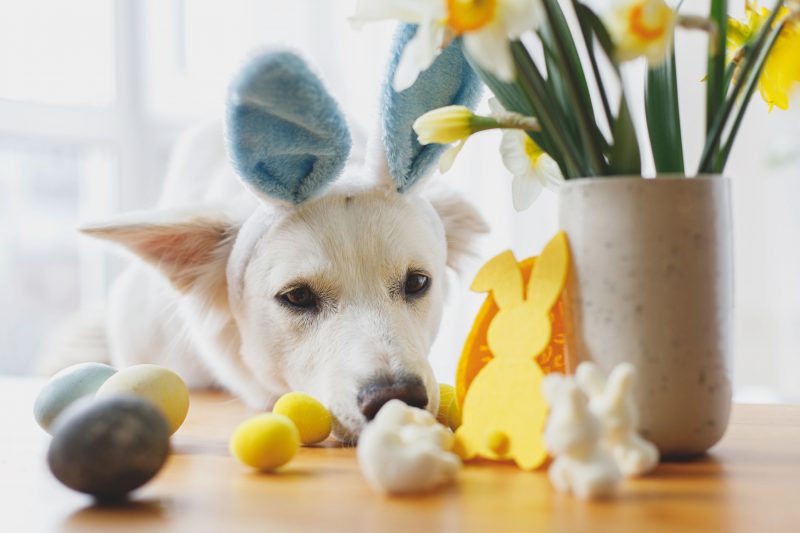
Easter will be here before we know it, and while you’re preparing for family gatherings, decorating the house, and shopping for Easter basket goodies, the team at Brownswitch Pet Hospital wants to remind you to keep the safety of your pets in mind.
Each Easter weekend, the ASPCA Animal Poison Control Center fields numerous calls related to possible pet poisonings from Easter treats and seasonal décor. Read on for the top five Easter hazards for pets so you can enjoy this spring’s holiday festivities while protecting your furry family members.
What Are Easter Hazards for Pets?
- Holiday Not-So-Sweet Treats
Nothing says Easter morning like a basketful of chocolate bunnies and eggs! And while these treats are absolutely delish for humans, they are strictly off-limits to pets. Both cats and dogs are at risk of chocolate toxicity due to two main ingredients: caffeine and another stimulant called theobromine. Ingesting these stimulants causes an elevated heart rate, plus gastrointestinal upset, including vomiting and diarrhea. High concentrations can lead to tremors, seizures, and even pancreatitis. Also keep in mind: the darker the chocolate, the more dangerous it is for pets.
Other sweet treats like sugar-free gum and other candies that contain the sugar substitute xylitol are also toxic to pets.
- Easter Grass
These colorful, skinny strands of plastic grass seem to beckon to our pets to come and taste a sample. But when pets eat Easter grass, it can get lodged in the intestinal tract and cause a life-threatening obstruction that requires surgery. Pets that eat plastic grass will likely exhibit vomiting, loss of appetite, and lethargy.
- Easter Lilies
If consumed, both lilies and daylilies can cause acute kidney failure in cats. Even the water that the flowers are kept in is toxic to cats. Here’s how to identify the lilies that are dangers to cats.
- Table Foods
Healthy diets for pets do not include people foods! Keep the following table foods out of reach of pets to avoid risk of stomach upset and pancreatitis:
- Fatty, salty, or sugary foods
- Alcohol
- Onions and garlic
- Macadamia nuts
- Grapes and raisins
- Poultry skin and bones
- Anything containing xylitol
- Herbicides and Fertilizers
If you’re planning to do some yard work during Easter weekend, keep lawn treatments like herbicides and fertilizers stored out of reach of pets in containers that can’t be chewed open. Apply the product as directed on the label, and refer to the product’s instructions to find out when it’s safe for pets to go outside.
We want you and your pets to enjoy a safe and “hoppy” Easter! If you think your pet has ingested or been exposed to something dangerous, please contact us right away, or call the ASPCA Animal Poison Control Center at (888) 426-4435.
